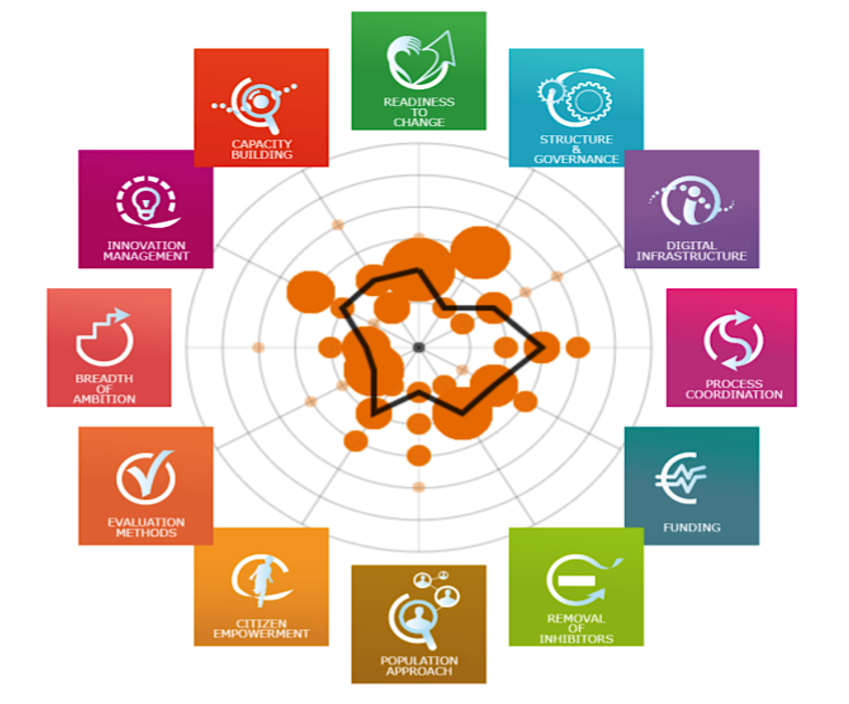Maturity Assessment Process - Slovakia
The organisation responsible for the self-assessment process is:
• Department of Social and Behavioural Medicine, Faculty of Medicine, PJ Safarik University in Kosice, Slovakia.
The region
Kosice is one of the eight administrative regions of Slovakia. With a population of almost 800,000 citizens, the healthcare system is based on statutory health insurance. A basic benefit package; universal population coverage; a competitive insurance model with selective contracting; and flexible pricing are core elements of this system. About 80% of healthcare spending in the Slovak Republic (SR) is publicly funded. Since 2014, the Slovak healthcare system is in a process of adopting new strategic planning framework which aims to ensure integrated outpatient care. Currently, there is a fragmentation of outpatient healthcare and excess demand for inpatient healthcare. The main goal of integrated care in the region is to: A) improve efficiency by strengthening primary care, and B) reduce reliance on the specialised care and hospital sector.
Maturity Assessment for Integrated Care
The maturity assessment process was fully conducted in Slovakian. The self-assessment process comprised two separate stages:
1. Individual self-assessment survey, completed by each appointed stakeholder
2. Online (because of COVID-19 restrictions) consensus building meeting
Due to the restrictions related to safety measures to prevent the spread of COVID-19 in Slovakia the consensus meeting was organized online using the GoToMeeting Platform.
Strengths identified through the Maturity Assessment process
- A single dimension has not been identified as having reached an appropriate maturity level.
- The final consensus showed that only one dimension (Process Coordination) achieved a slightly higher, but still not satisfactory, level of maturity (score 2).
- The overall dimension score was very poor and the maturity level in the final consensus varied between 0 (in 4 dimensions) and 1 (in 7 dimensions). The need for improvement in all assessed dimensions is necessary to deploy integration.
Weaknesses identified through the Maturity Assessment process
The maturity level was found to have the lowest value (score 0) in the four following dimensions:
- Structure & Governance; Population Approach; Evaluation Methods and Breadth of Ambition.
- Of those, Structure & Governance dimension seems to be the most important starting point that may help to facilitate the process of adoption and implementation of other inevitable changes.
- One of the key challenges recognised in this process is lack of communication and coordination between the Ministry of Health and the Ministry of Labour, Social Affairs and Family.
Other key messages which have been identified as a result of participation in the maturity assessment process included:
- Governmental and regional authorities are aware of the lack of integration between health and social systems, including the long-term care.
- Nevertheless, no efficient national and regional policy, guidance, nor systematic actions have been taken.
- Specific factors need to be taken into account to understand strengths and weaknesses in Kosice Region, including structural characteristics and cultural factors which may sometimes result in barriers, e.g. the need for integrated care is accepted, but only in terms of individual values.
- Regarding funding, although a level of funding within the EU sources is available, these financial resources are primarily used for the (re)construction of so called ‘integrated care’ centres.
- An expert working group that would be able to advise/propose measures for integration process at the regional and/or municipality level is needed.
The spider diagram illustrates the outcomes of the final consensus on the maturity for integrated care in the Kosice region of Slovakia.

The final report which will provide much more detailed information about the region and the process is available to download in the Maturity Assessment Reports section in Resources.


The project SCIROCCO Exchange is co-funded by the Health Programme of the European Union under Grant Agreement 826676 (Chafea)


